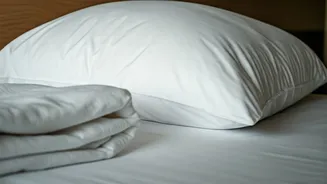Establish a Routine
The first essential tip to enhance sleep is to set up a regular sleep schedule. The human body thrives on predictability; therefore, going to bed and waking
up around the same time daily, even on weekends, can improve your sleep. Creating a consistent sleep schedule can assist in regulating your body's natural sleep-wake cycle, known as the circadian rhythm. Avoid drastically changing your sleep patterns, which can disrupt your sleep cycle. Regular routines can train your body to feel tired and be ready for sleep around the set times. Implement a bedtime routine that could include relaxing activities like reading a book or listening to calming music.
Create Sleep-Conducive Environment
The environment you sleep in greatly influences sleep quality. It is crucial to have a dark, quiet, and cool bedroom, as these conditions are ideal for sleep. Light and noise can disrupt your sleep cycle and make it harder to fall asleep and stay asleep. A cool temperature can also help, as the body's core temperature drops naturally when you sleep. Consider using blackout curtains to block out light, earplugs or a white noise machine to mask unwanted sounds, and adjust your thermostat to a comfortable temperature. Make sure the bed and pillows are comfortable, which will improve the quality of your sleep. Moreover, your bedroom should be exclusively for sleep and relaxing activities.
Limit Caffeine & Alcohol
Caffeine and alcohol, although seemingly helpful for sleep at first, can disrupt sleep patterns and worsen insomnia. Caffeine, a stimulant, can stay in your system for several hours, making it difficult to fall asleep. Avoid consuming caffeine in the afternoon or evening. Alcohol might make you feel sleepy initially, but it disrupts sleep later in the night, leading to frequent awakenings and a poor quality of sleep. It is recommended to avoid alcohol close to bedtime and allow your body to recover. For better sleep, limit caffeine and alcohol consumption, particularly close to bedtime. This includes coffee, tea, energy drinks, and alcoholic beverages.
Manage Stress & Anxiety
Stress and anxiety can significantly impair sleep quality, causing difficulty falling asleep, staying asleep, and leading to restless nights. Before bed, create a relaxing routine to ease your mind and body. This could involve deep breathing exercises, meditation, or gentle stretching. Practicing these activities can help reduce stress levels and prepare your body for sleep. If you find your worries are keeping you awake, try journaling, where you can write down your thoughts to process them. Address any underlying issues contributing to stress to improve your sleep. Consulting a therapist or counselor might be helpful for managing chronic anxiety and stress that affects your sleep.
Consult Healthcare Professionals
If you struggle with chronic sleep problems, seeking professional help is a vital step. When home remedies and lifestyle changes aren't effective, it's wise to consult your doctor or a sleep specialist. They can identify any underlying medical conditions or sleep disorders that could be interfering with your sleep. Your doctor may also recommend tests, and treatments tailored to your specific needs. Do not hesitate to seek help if you're experiencing symptoms of insomnia. Consulting a healthcare professional can ensure you're receiving the correct diagnosis and effective treatment. They can offer advice on sleep hygiene or prescribe medication to resolve any sleep-related concerns and improve your overall health.



















